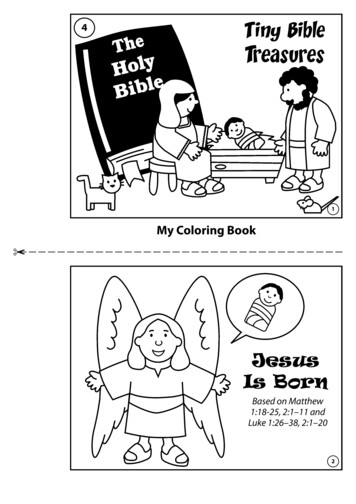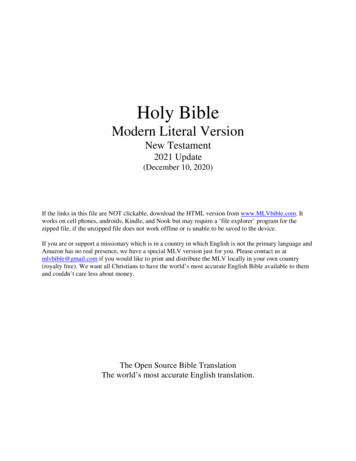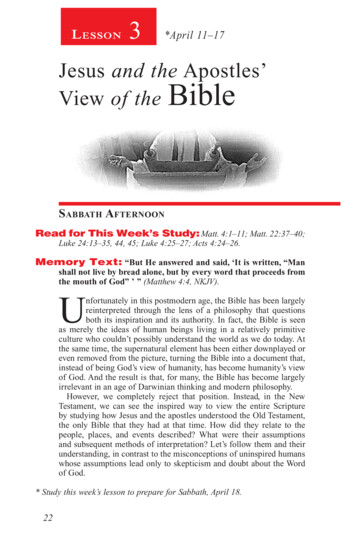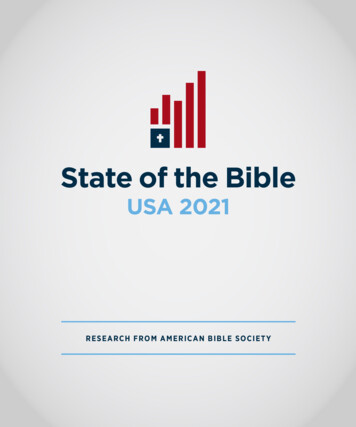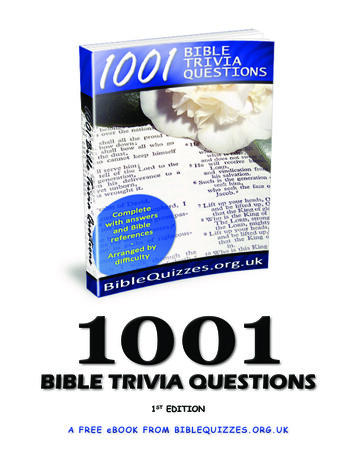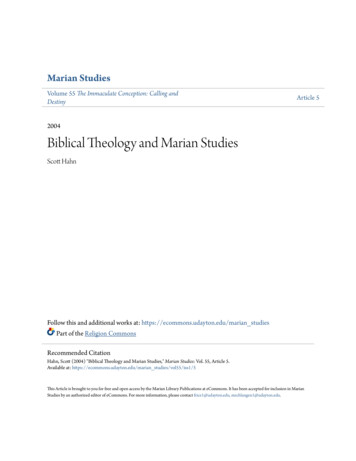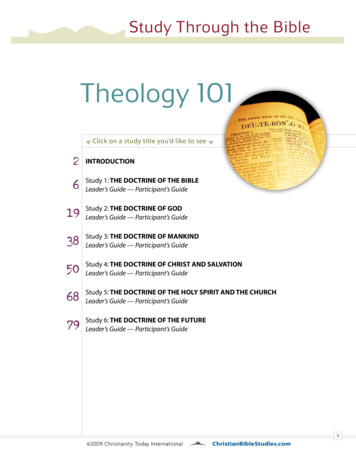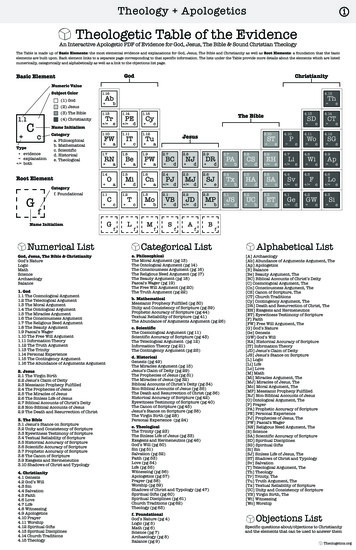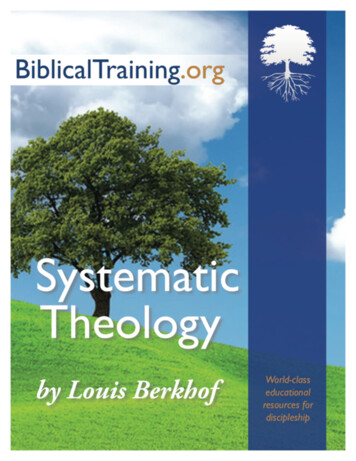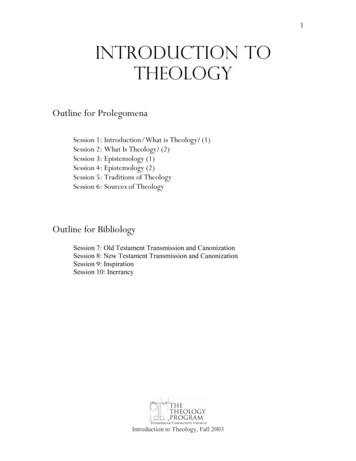
Transcription
1Introduction toTheologyOutline for ProlegomenaSession 1: Introduction/What is Theology? (1)Session 2: What Is Theology? (2)Session 3: Epistemology (1)Session 4: Epistemology (2)Session 5: Traditions of TheologySession 6: Sources of TheologyOutline for BibliologySession 7: Old Testament Transmission and CanonizationSession 8: New Testament Transmission and CanonizationSession 9: InspirationSession 10: InerrancyIntroduction to Theology, Fall 2003
2ProlegomenaDeut 29:29“The secret things belong to the LORD our God, but the things revealed belong to us andto our sons forever, that we may observe all the words of this law.”Session 1 & 2: What Is Theology?OutlineI. What Is Theology?II. Who Is a Theologian?III. Categories of TheologyI.What Is Theology?Write a one or two sentence definition of theology:Introduction to Theology, Fall 2003
3“Rational discussionrespecting the deity.”—Augustine“Thinking about Godand expressing thosethoughts in some way.”—Charles RyrieII.“The science of God, andof the relation between Godand the Universe.”—A.H. Strong“The study of Scienceof God.”—Millard EricksonWho Is a Theologian?Who is a theologian? Anyone who has asked the ultimate questions of life:¾ Why am I here?¾ What is life?¾ What happens afterdeath?¾ What is thedifference betweenright and wrong?The question is not, “Who is atheologian?” but “What kind oftheologian am I going to be?” Are yougoing to be a good theologian or a badtheologian?” This is a more accuratequestion because, as one writer put it,“not all theologies are equal.”-Source unknown¾ Why is there somethinginstead of nothing?Introduction to Theology, Fall 2003
4Five arenas in which we can do theology:1. Folk Theology3. Ministerial TheologyFolk2. Lay Theology4. Professional TheologyLay5. Academic TheologyMinisterialProfessional AcademicIntroduction to Theology, Fall 2003
5I. Folk TheologyNaïveTraditionalisticDogmaticUninformed and unreflectiveWhat are some examples?II. Lay TheologyMore reflective upon learned theological conceptsLikely to formulate a doctrine of essentialityMore critical of unfounded traditionsMore willing to use study toolsWhat are some examples?Introduction to Theology, Fall 2003
6III. Ministerial TheologyReflection is more sophisticatedEducated in theological methodologyUses tools and resources at a more effective levelWorking knowledge of the languagesAbility to openly critique personal theology against competing modelsDevotes more time to reflectionWhat are some examples?IV. Professional TheologyDidactically purposed toward lay and pastoral theologiansWorks with pastoral and lay theologiansConducts practical original researchCritically evaluates common theological trends and folk theologyOften accused of quenching the SpiritWhat are some examples?Introduction to Theology, Fall 2003
7V. Academic TheologyOverly speculativeOverly criticalDialogue can come only with other theologiansIvory Tower theologiansUnspiritual theologyFollows the academic status quoWhat are some examples?“Theology is for everyone. Indeed, everyoneneeds to be a theologian. In reality, everyone is atheologian — of one sort or another.And therein lies the problem. There is nothingwrong with being an amateur theologian or aprofessional theologian, but there is everythingwrong with being an ignorant or sloppytheologian.”-Charles RyrieIntroduction to Theology, Fall 2003
8How do we “do” theology everyday? Inother words, how does our theologyinfluence our daily routine?What Is Theology and Who Is a Theologian?“Credo ut intelligam”--Anselm of CanterburyIntroduction to Theology, Fall 2003
9III. Categories of TheologyA. Systematic1. Prolegomena:Literally means “first word.” Deals with the of theology such astheological methodology, sources, and reasons for the study of theology.2. Bibliology:The study of the , , , and of Scripture.3. Theology Proper:The study of God’s . Sometimes called .4. Christology:The study of the and of Christ.5. Pneumatology:The study of the person and work of the .6. Anthropology:The study of the nature of both in its pre-fall and post-fall state.7. Harmartiology:The study of the nature, origin, and effects of on all creation.8. Angelology:The study of the nature and works of and .9. Soteriology:The study of .10. Ecclesiology:The study of the nature of the .Introduction to Theology, Fall 2003
1011. Eschatology:The study of the .B. BiblicalBiblicalSystematic Restricts its study to the Scripture. Examines the parts of Scripture. Compiles information on a doctrinefrom a specific writer (e.g., John orPaul) or a particular era (e.g.,Abrahamic, Mosaic, prophetic). Seeks to understand the process aswell as the result — the product. Seeks truth from Scripture andfrom any source outside the Bible. Examines the whole of Scripture. Compiles information on a doctrineby correlating all the Scriptures. Seeks to understand the result —the product.Relationship of Systematic TheologyApologetic TheologyCreedal/Dogmatic TheologyIntroduction to Theology, Fall 2003
11Theological Statement“What timeless truth is being taught?”Extract timeless truth principlesHomiletical Statement“How does it apply to us?”Exegetical Statement“What did it mean then?” Historical interpretationGrammatical interpretationLiterary interpretationContextual interpretationPreach it!Introduction to Theology, Fall 2003
12C. HistoricalD. Creedal/DogmaticE. ApologeticF. PhilosophicalIntroduction to Theology, Fall 2003
13Session 3 & 4: EpistemologyWhat is Epistemology?“The branch of philosophy that isconcerned with the theory ofknowledge. It is an inquiry intothe nature and source ofknowledge, the bounds ofknowledge, and the justificationof claims to knowledge.”—Feinberg“The theory or science of themethod or grounds ofknowledge.”—WebsterToday evangelical Christians stand at a greater distance fromthose with whom we communicate than we did just 20 years ago.At that time, even those who rejected Christianity were preparedto discuss whether the evidence for Christianity’s truth wasadequate. Today, this is much less frequently the case. Beforewe can broach the question of whether the Christian gospel istrue, we have to establish that such a thing as truth exists.A Conversation Between Protagoras and Socrates (4thCentury B.C.)Protagoras: Truth is relative. It is only a matter of opinion.Socrates: You mean that truth is mere subjective opinion?Protagoras: Exactly. What is true for you is true for you, andwhat is true for me is true for me. Truth is subjective.Socrates: Do you really mean that? That my opinion is true byvirtue of its being my opinion?Protagoras: Indeed I do.Socrates: My opinion is: Truth is absolute, not opinion, and thatyou, Mr. Protagoras, are absolutely in error. Since this is myIntroduction to Theology, Fall 2003
14opinion, then you must grant that it is true according to your philosophy.Protagoras: You are quite correct, Socrates.Epistemology: A historical survey—three periods:1) Premodern (400-1600 A.D.)2) Modern (1600-1900 A.D.)3) Postmodern (1960-present)1. Premodern2. Modern3. PostmodernIntroduction to Theology, Fall 2003
15Modernist Objections to ChristianityWhat about all the contradictions?God is just a crutch. Religion was invented by man.Jesus was just a man.The Bible we have today is not the same as when it was written two thousandyears ago.I don’t believe in what I can’t see.Evolution has proven Christianity to be wrong.The Bible is a myth full of fairy tales.How did Noah get all of the animals on the Ark?There are no such thing as miracles.Do you really believe in the story of Adam and Eve?Postmodernist Objections to ChristianityIf God exists why is there evil?The inquisition and the Crusades show that Christianity is oppressive.Christianity is a way to God but not the only way.Christianity is arrogant andexclusive.How do you know thatyour Bible is better thanother religious writings?Why does God allow badthings to happen to goodpeople?“In postmodernism, there is no objective,universal truth; there is only the perspective ofthe group. . . . In postmodernism, allviewpoint, all lifestyles, all beliefs andbehaviors are regarded as equally valid. . . .Tolerance has become so important that noexception is tolerated.”Charles Colson, How Now Shall We Live?, 23Introduction to Theology, Fall 2003
16What about those who have never heard?The church is full of hypocrites.Why would God send anyone to Hell?The God of the OT is cruel, partial, and unjust.A. Modern View of TruthCorrespondence view of truth:(1) Truth is an objective reality that existswhether someone believes it or not, (2) and thatobjective reality has no definite basis.Example: True statements are that which to reality.False statements are those that do not toreality.Law of non-contradiction appliesA -A at the same time and in the same relationship.Key Motto: Man can know all truth.B. Postmodern View of TruthIntroduction to Theology, Fall 2003
17Relativism, Subjectivism,PragmatismRelativism: what is right/wrong, true/false isdetermined by some group.Subjectivism: what is right/wrong, true/false isdetermined by each individual.Pragmatism: Truth is what works.Example:Law of non-contradiction does not applyA -A at the same time and in the same relationship.No objective truthKey Motto: Truth cannot be known.Religious Spin on Postmodern usivism:All will make it to Heaven.Many ways to God, most of which are equally valid.Assimilation of differing beliefs and practices.Salvation is only through Christ, but Christ may be revealed in otherreligions.Introduction to Theology, Fall 2003
18C. Christian View of TruthWhat is the Christian view of truth?Correspondence view of truth:(1) Truth is an objective reality that existswhether someone believes it or not, (2) and thatobjective reality has God alone as its objectivebasis.The law of non-contradiction is a foundational necessity to all truth.God cannot even violate this principle since it is a logical impossibility.Key Motto: “The secret things belong to the LORD our God, but the things revealedbelong to us and to our sons forever, that we may observe all the words of this law.”(Deut. 29:29)PrinciplesThere are truths that .These are truths that .There are truths that .They are binding .They are binding .They are binding .They have .Introduction to Theology, Fall 2003
19Session 5 & 6: Traditions inTheologyThree main traditions:1) Roman Catholic2) Eastern Orthodox3) ProtestantProtestant View of Church HistoryRoman Catholic View of Church HistoryIntroduction to Theology, Fall 2003
20Eastern Orthodox View of Church HistorySub-traditions:1) Reformed2) Arminian3) Liberal4) Charismatic5) Fundamental6) EvangelicalIntroduction to Theology, Fall 2003
21Introduction to Theology, Fall 2003
22Session 6 & 7: Sources of TheologyFive primary sources of theology:1.2.3.4.5.General RevelationSpecial RevelationTraditionExperienceReason1. General RevelationRevelation about God given through the created order (Ps 19:1-6; Rom 1:1820; 2:14-15).Examples:Introduction to Theology, Fall 2003
23Benefits:Deficiencies:2. Special RevelationRevelation given by God’s supernatural intervention in history through (1) miraculousevents, (2) divine speech, and (3) visible manifestations.Examples:Benefits:Deficiencies:3. TraditionReligious information that has been handed down to us from various avenues.Examples:Benefits:“Tradition is the living faith ofthose now dead.Traditionalism is the dead faithof those now living”—Jarislav PelikanDeficiencies:Introduction to Theology, Fall 2003
244. ExperienceInformation that comes through personal experience and feelings.Examples:Benefits:Deficiencies:5. ReasonInformation that comes through the human mind’s capacity for logical, rational, andanalytic n to Theology, Fall 2003
25Excursus: Does God Still Speak Today?Has special revelation ceased or does God still communicate to people throughdreams, visions, or audible encounters?Three positions:1. Cessationism1. Charles Ryrie2. John Walvoord3. John MacArthur4. Charles Swindoll5. Most all of church historyAdherents2. Continuationist1. Wayne Grudem2. Jack Deere3. Craig Keener4. Jack HayfordAdherents3. Open-But-CautiousAdherents1. D. A. Carson2. Robert Saucy3. Hank HanegraffIntroduction to Theology, Fall 2003
26Key Terms for Prolegomena1. Prolegomena: Literally means “to say beforehand.” Deals with the foundational issues oftheology such as theological methodology, sources, and reasons for the study of theology.2. Bibliology: The study of the nature, transmission, canonization, and purpose of Scripture.3. Theology Proper: The study of God’s nature, sometimes called “Trinitarianism.”4. Christology: The study of the person and work of Christ.5. Pneumatology: The study of the nature and work of the Holy Spirit.6. Anthropology: The study of the nature of humanity both in its pre-fall and post-fall state.7. Angelology: The study of the nature and works of demons and angels.8. Soteriology: The study of salvation.9. Ecclesiology: The study of the nature of the Church.10. Harmartiology: The study of sin.11. Eschatology: The study of the last things.12. Evangelical: A transdenominational term used to describe those within Christianity who believethat salvation is found in faith alone through Christ alone, and a commitment to Scripture as theinspired and infallible rule
The Bible we have today is not the same as when it was written two thousand years ago. I don’t believe in what I can’t see. Evolution has proven Christianity to be wrong. The Bible is a myth full of fairy tales. How did Noah get all of the animals on the Ark? There are no such thing as miracles. Do you really believe in the story of Adam .

